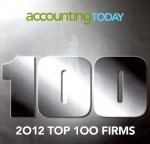There’s a session we do at Boot Camp where we talk about the issue of differentiation in the context of positioning and ask participants to list the services or activities their firm offers that represent customer value propositions.
Predictably, the list is long but we rarely see anything on it that other firms don’t do, could not do or represent something of real value to a client. People buy, or are at least interested in, differences and yet the typical menu of services offered by accounting practices in print or on the web reflect sameness. How can you expect a prospect to think about switching to your firm if you are not different in a way that is likely to be more valuable than your current service provider? Continue reading “Take a look at this firm’s advertisement through the eyes of a customer or prospect”

 About this time every year I wait anxiously for my copy of Accounting Today’s Top 100 US accounting firms – well, perhaps I’m not that excited about it but I certainly find it interesting that we seem to place so much store on revenue as a measure of success. This year’s report (as is always the case I might add) is interesting so I thought I’d make a few observations.
About this time every year I wait anxiously for my copy of Accounting Today’s Top 100 US accounting firms – well, perhaps I’m not that excited about it but I certainly find it interesting that we seem to place so much store on revenue as a measure of success. This year’s report (as is always the case I might add) is interesting so I thought I’d make a few observations.